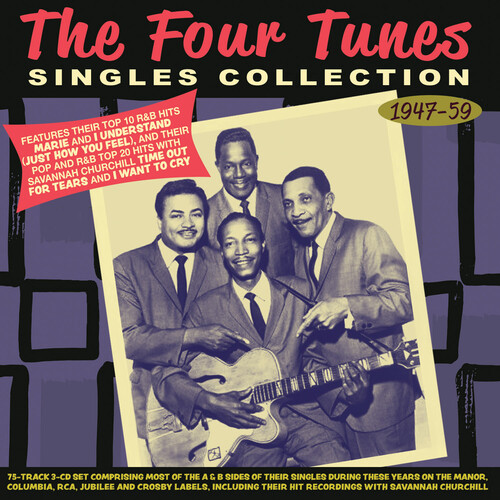Show results for
Explore
In Stock
Artists
Actors
Authors
Format
Theme
Category
Genre
Rated
Label
Specialty
Decades
Size
Color
Deals
- 4K Ultra HD Sale
- Action Sale
- Alternative Rock Sale
- Anime sale
- Award Winners Sale
- Bear Family Sale
- Blu ray Sale
- Blues on Sale
- British Sale
- Classical Music Sale
- Comedy Music Sale
- Comedy Sale
- Country Sale
- Criterion Sale
- Cult Films sale
- Drama Sale
- Electronic Music sale
- Horror Sci fi Sale
- Jazz Sale
- Kids and Family Sale
- Metal Sale
- Music Video Sale
- Musicals on Sale
- Mystery Sale
- Naxos Label Sale
- Page to Screen Sale
- Paramount Sale
- Rap and Hip Hop Sale
- Reggae Sale
- Rock
- Rock and Pop Sale
- Rock Legends
- Soul Music Sale
- TV Sale
- Vinyl on Sale
- War Films and Westerns on Sale

Singles Collection 1947-59
- Artist: The Four Tunes
- Format: CD
- Release Date: 6/4/2021

Singles Collection 1947-59
- Artist: The Four Tunes
- Format: CD
- Release Date: 6/4/2021
- Artist: The Four Tunes
- Label: Acrobat
- Number of Discs: 3
- UPC: 824046910921
- Item #: 2396752X
- Genre: Soul/R & B
- Release Date: 6/4/2021
- This product is a special order

Product Notes
The Four Tunes were a doowop quartet which evolved from The Brown Dots and The Sentimentalists during the mid-1940s, initially performing in the traditional style of Groups like the Ink Spots and Mills Brothers, but moving towards the more R&B-styled doowop genre by the end of the decade, and developed a more pop-oriented approach than many other groups of the era. Featuring baritone Pat Best, tenors Jimmie Nabbie and Danny Owens, and bass Jimmy Gordon for the majority of their primary career, they were one of the most respected and highly-regarded harmony quartets of the classic doowop years. This excellent-value 75-track 3-CD set comprises a significant proportion of the A & B sides of their singles during these years on the Manor, Columbia, RCA, Jubilee and Crosby labels, including their hit recordings with Savannah Churchill. It features their No. 2 R&B and No. 13 pop hit "Marie" and their No. & R&B and No. 6 pop hit "I Understand (Just How You Feel)", both from 1953,)", and their 1948 pop and R&B Top 20 hits with Savannah Churchill "Time Out For Tears" and "I Want To Cry". With a repertoire encompassing Great American Songbook standards and contemporary R&B compositions, this collection traces their career and the progression of their style from the immediate post-war years into the rock 'n' roll era, and provides a fine showcase for their acutely developed talents as a harmony group.
Credits
-
Artist(s)The Four Tunes

